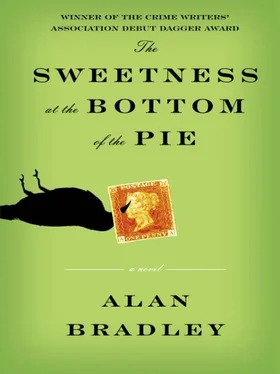Alan Bradley - The Sweetness at the Bottom of the Pie
Здесь есть возможность читать онлайн «Alan Bradley - The Sweetness at the Bottom of the Pie» весь текст электронной книги совершенно бесплатно (целиком полную версию без сокращений). В некоторых случаях можно слушать аудио, скачать через торрент в формате fb2 и присутствует краткое содержание. Жанр: Старинная литература, на английском языке. Описание произведения, (предисловие) а так же отзывы посетителей доступны на портале библиотеки ЛибКат.
- Название:The Sweetness at the Bottom of the Pie
- Автор:
- Жанр:
- Год:неизвестен
- ISBN:нет данных
- Рейтинг книги:3 / 5. Голосов: 1
-
Избранное:Добавить в избранное
- Отзывы:
-
Ваша оценка:
- 60
- 1
- 2
- 3
- 4
- 5
The Sweetness at the Bottom of the Pie: краткое содержание, описание и аннотация
Предлагаем к чтению аннотацию, описание, краткое содержание или предисловие (зависит от того, что написал сам автор книги «The Sweetness at the Bottom of the Pie»). Если вы не нашли необходимую информацию о книге — напишите в комментариях, мы постараемся отыскать её.
The Sweetness at the Bottom of the Pie — читать онлайн бесплатно полную книгу (весь текст) целиком
Ниже представлен текст книги, разбитый по страницам. Система сохранения места последней прочитанной страницы, позволяет с удобством читать онлайн бесплатно книгу «The Sweetness at the Bottom of the Pie», без необходимости каждый раз заново искать на чём Вы остановились. Поставьте закладку, и сможете в любой момент перейти на страницу, на которой закончили чтение.
Интервал:
Закладка:
"Flavia!" Miss Cool said, scrambling to her feet, her words muffled by the window glass. "What on earth —?"
She snatched her false teeth from a tumbler and rammed them into her mouth, then vanished for a moment, and as I leaped to the ground I heard the sound of the bolt being shot back. The door opened inwards to reveal her standing there—like a trapped badger—in a housedress, her hand clutching and opening in nervous spasms at her throat.
"What on earth.?" she repeated. "What's the matter?"
"The front door's locked," I said. "I couldn't get in."
"Of course it's locked," she said. "It's always locked on Sundays. I was having a nap."
She rubbed at her little black eyes, which were still squinting at the light.
Slowly it dawned on me that she was right. It was Sunday. Although it seemed aeons ago, it was only this morning that I had been sitting in St. Tancred's with my family.
I must have looked crushed.
"What is it, dear?" Miss Cool said. "That horrid business up at Buckshaw?"
So she knew about it.
"I hope you've had the good sense to keep away from the actual scene of the—"
"Yes, of course, Miss Cool," I said with a regretful smile. "But I've been asked not to talk about that. I'm sure you'll understand."
This was a lie, but a first-rate one.
"What a good child you are," she said, with a glance up at the curtained windows of an adjoining row of houses that overlooked her yard. "This is no place to talk. You'd better come inside."
She led me through a narrow hallway, on one side of it her tiny bedroom, and on the other, a miniature sitting room. And suddenly we were in the shop, behind the counter that served as the village post office. Besides being Bishop's Lacey's only confectioner, Miss Cool was also its postmistress and, as such, knew everything worth knowing—except chemistry, of course.
She watched me carefully as I looked round with interest at the tiers of shelves, each one lined with glass jars of horehound sticks, bull's-eyes, and hundreds-and-thousands.
"I'm sorry. I can't do business on a Sunday. They'd have me up before the magistrates. It's the law, you know."
I shook my head sadly.
"I'm sorry," I said. "I forgot what day it was. I didn't mean to frighten you."
"Well, no real harm done," she said, suddenly recovering her usual garrulous powers as she bustled about the shop, aimlessly touching this and that.
"Tell your father there's a new set of stamps coming out soon, but nothing to go into raptures about, at least to my way of thinking, anyways. Same old picture of King George's head, God bless 'im, but tarted up in new colors."
"Thank you, Miss Cool," I said. "I'll be sure to let him know."
"I'm sure that lot at the General Post Office up in London could come up with something better than that," she went on, "but I've heard as how they're saving up their brains for next year to celebrate the Festival of Britain."
"I wonder if you could tell me where Miss Mountjoy lives," I blurted.
"Tilda Mountjoy?" Her eyes narrowed. "Whatever could you want with her?"
"She was most helpful to me at the library, and I thought it might be nice to take her some sweets."
I gave a sweet smile to match the sentiment.
This was a shameless lie. I hadn't given the matter a moment's thought until now, when I saw that I could kill two birds with one stone.
"Ah, yes," Miss Cool said. "Margaret Pickery off to tend the sister in Nether-Wolsey: the Singer, the needle, the finger, the twins, the wayward husband, the bottle, the bills. a moment of unexpected and rewarding usefulness for Tilda Mountjoy.
"Acid drops," she said suddenly. "Sunday or no, acid drops would be the perfect choice."
"I'll have sixpence worth," I said.
". and a shilling's worth of the horehound sticks," I added. Horehound was my secret passion.
Miss Cool tiptoed to the front of the shop and pulled down the blinds.
"Just between you and me and the gatepost," she said in a conspiratorial voice.
She scooped the acid drops into a purple paper bag of such a funereal color that it simply cried out to be filled with a scoop or two of arsenic or mix vómica .
"That will be one-and-six," she said, wrapping the hore hound sticks in paper. I handed her two shillings and while she was still digging in her pockets I said, "That's all right, Miss Cool, I don't require change."
"What a sweet child you are." She beamed, slipping an extra horehound stick into the wrappings. "If I had children of my own, I couldn't hope to see them half so thoughtful or so generous."
I gave her a partial smile and kept the rest of it for myself as she directed me to Miss Mountjoy's house.
"Willow Villa," she said. "You can't miss it. It's orange."
WILLOW VILLA WAS, as Miss Cool had said, orange; the kind of orange you see when the scarlet cap of a Death's Head mushroom has just begun to go off. The house was hidden in the shadows beneath the flowing green skirts of a monstrous weeping willow whose branches shifted uneasily in the breeze, sweeping bare the dirt beneath it like a score of witches' brooms. Their movement made me think of a piece of seventeenth-century music that Feely sometimes played and sang—very sweetly, I must admit—when she was thinking of Ned:
The willow-tree will twist,
and the willow-tree will twine,
O I wish I was in the dear youth's arms that once had
the heart of mine.
The song was called “The Seeds of Love,” although love was not the first thing that came to mind whenever I saw a willow; on the contrary, they always reminded me of Ophelia (Shakespeare's, not mine) who drowned herself near one.
Except for a handkerchief-sized scrap of grass at one side, Miss Mountjoy's willow filled the fenced-in yard. Even on the doorstep I could feel the dampness of the place: the tree's languid branches formed a green bell jar through which little light seemed to penetrate, giving me the odd sensation of being under water. Vivid green mosses made a stone sponge of the doorstep, and water stains stretched their sad black fingers across the face of the orange plaster.
On the door was an oxidized brass knocker with the grinning face of the Lincoln Imp. I lifted it and gave a couple of gentle taps. As I waited, I gazed absently up into the air in case anyone should be peeking out from behind the curtains.
But the dusty lace didn't stir. It was as if there was no breath of air inside the place.
To the left, a walk cobbled with old, worn bricks led round the side of the house, and after waiting at the door for a minute or two, I followed it.
The back door was almost completely hidden by long tendrils of willow leaves, all of them undulating with a slightly expectant swishing, like a garish green theater curtain about to rise.
I cupped my hands to the glass at one of the tiny windows. If I stood on tiptoe—
"What are you doing here?"
I spun round.
Miss Mountjoy was standing outside the circle of willow branches, looking in. Through the foliage, I could see only vertical stripes of her face, but what I saw made me edgy.
"It's me, Miss Mountjoy. Flavia," I said. "I wanted to thank you for helping me at the library."
The willow branches rustled as Miss Mountjoy stepped inside the cloak of greenery. She was holding a pair of garden shears in one hand and she said nothing. Her eyes, like two mad raisins in her wrinkled face, never left mine.
I shrank back as she stepped onto the walk, blocking my escape.
"I know well enough who you are," she said. "You're Flavia Sabina Dolores de Luce—Jacko's youngest daughter."
"You know he's my father?!" I gasped.
"Of course I know, girl. A person of my age knows a great deal."
Читать дальшеИнтервал:
Закладка:
Похожие книги на «The Sweetness at the Bottom of the Pie»
Представляем Вашему вниманию похожие книги на «The Sweetness at the Bottom of the Pie» списком для выбора. Мы отобрали схожую по названию и смыслу литературу в надежде предоставить читателям больше вариантов отыскать новые, интересные, ещё непрочитанные произведения.
Обсуждение, отзывы о книге «The Sweetness at the Bottom of the Pie» и просто собственные мнения читателей. Оставьте ваши комментарии, напишите, что Вы думаете о произведении, его смысле или главных героях. Укажите что конкретно понравилось, а что нет, и почему Вы так считаете.












